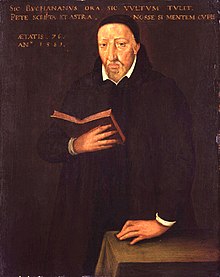George Buchanan
| George Buchanan | |
|---|---|

George Buchanan by A Bronckorst, 1581 (National Gallery of Scotland).
|
|
| Born | February 1506 Killearn, Stirlingshire, Scotland |
| Died | 28 September 1582 (aged 76) Edinburgh, Scotland |
| Nationality | Scottish |
| Occupation | historian, scholar |
George Buchanan (Scottish Gaelic: Seòras Bochanan; February 1506 – 28 September 1582) was a Scottish historian and humanist scholar. According to historian Keith Brown, Buchanan was "the most profound intellectual sixteenth century Scotland produced." His ideology of resistance to royal usurpation gained widespread acceptance during the Scottish Reformation. Brown says the ease with which King James VII was deposed in 1689 shows the power of Buchananite ideas.
His father, a Highlander and a younger son of an old family, owned the farm of Moss, in the parish of Killearn, Stirlingshire, but he died young, leaving his widow, five sons, and three daughters in poverty. George's mother, Agnes Heriot, was of the family of the Heriots of Trabroun, East Lothian, of which George Heriot, founder of Heriot's Hospital, was also a member. Buchanan, a native speaker of Scottish Gaelic, is said to have attended Killearn school, but not much is known of his early education. His brother, Patrick Buchanan, was also a scholar. In 1520 he was sent by his uncle, James Heriot, to the University of Paris, where he first came in contact with the two great influences of the age, the Renaissance and the Reformation. There, according to him, he devoted himself to the writing of verses "partly by liking, partly by compulsion (that being then the one task prescribed to youth)".
In 1522 his uncle died, and George Buchanan, who was at that time severely ill, was unable to stay in Paris and returned to Scotland. After recovering from his illness, he joined the French auxiliaries who had been brought over to Scotland by John Stewart, Duke of Albany, and took part in an unsuccessful siege of Wark Castle on the border with England in late 1523. In the following year he entered the University of St Andrews, where he graduated B.A. in 1525. He had gone there mainly to attend the lectures of John Mair on logic; and when Mair moved to Paris, Buchanan followed him in 1526.
...
Wikipedia
